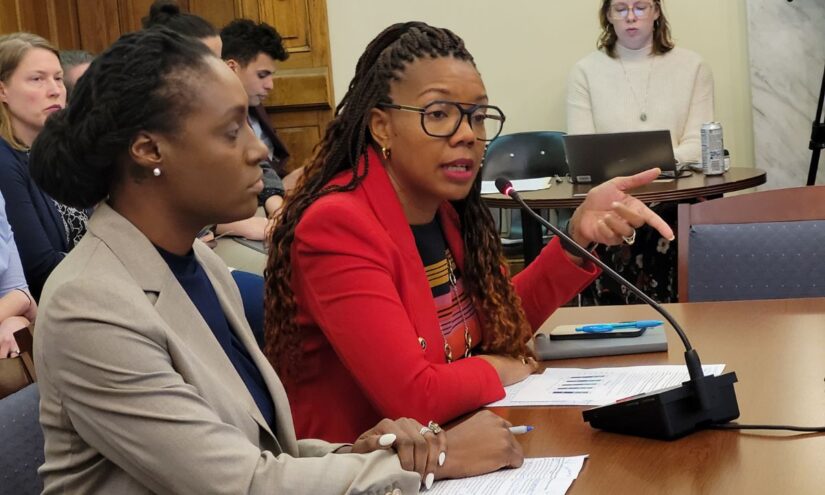Get stories like this delivered straight to your inbox. Sign up for The 74 Newsletter
Indiana’s charter school advocates’ push to shift property tax money and other resources from districts to charters has sparked heated debate — with charters saying their students are shortchanged and school districts warning they could be forced to close schools.
The battle is playing out around three bills before the Indiana state legislature as it grapples with the rapid growth of charter schools, especially in Indianapolis.
More than 60% of Indianapolis public school students attend charter schools, making the city a national leader to school choice advocates.
One of the three bills would have eliminated the Indianapolis Public Schools and four other districts, but failed to pass out of committee earlier this week. Instead, the bill that has gained the most traction would shift $80 million in local annual property taxes from school districts to charters. The move is aimed at closing a funding gap between district and charter schools which one study estimates at $8,000 per student in Indianapolis, with districts spending $18,500 and charters $10,600.
The state Senate passed that bill Wednesday after agreeing to delay some of the tax sharing until 2028. It now heads to the Indiana House.
State Sen. Linda Rogers, author of the bill, said local property taxes should “follow the student” to any school they choose, as state aid already does.
“Local funding today… remains with the district, even though the student living in the district may not be receiving their education there,” Rogers said in a committee hearing on the bill last week that drew impassioned testimony from more than 50 supporters and critics.
“If you have thousands of students that you’re getting paid for, that you’re not educating, is that fair?” she added.
Kim Reier, vice president of strategy for the Indiana Charter School Alliance, said the state must stop “prioritizing institutions” like districts instead of individual schools.
“Families who choose charter schools still pay the same property taxes, yet those dollars remain locked in the districts that they no longer attend,” Reier testified.
But at the same hearing, Indianapolis Public Schools officials said the bill would devastate the district. Superintendent Aleesia Johnson said the bill would force the district to close 20 schools, cut busing for students and likely hurt its partnership with some charter schools known as Innovation Schools.
She also joined critics of charter school growth who say it has led to an “oversaturation” of schools in the city for the number of students.
“Because there are currently no limitations of the number of new charter schools that can be opened in our boundary, the dollars will continue to be more and more splintered until every school gets something, but no school gets enough,” Johnson said.
The most extreme of the three bills — one that would wipe out the Indianapolis school district and turn all 50 of its schools over to charters — did not win enough support to even have a hearing. But it both loomed as a threat in case no funding changes pass and as a rallying cry for the district, which called on residents to fight to save its schools.
A third bill aimed at providing charters and private schools with two crucial needs — school buildings and busing — also awaits a hearing in the House Education Committee. That bill would appoint facilities and student transportation boards in Indianapolis and four other cities to take control of all district, charter and private school buses and buildings. Boards would include two appointees by the mayor, one by city council and two by state house and senate leaders.
The boards would then award buildings to school operators, district, charter and private, deemed most promising and coordinate busing for students of all schools in the city.
The bill calls for those panels to launch in the 2026-27 school year and take control of buildings over time, but legislators are considering delaying them to study how they would work.
Rogers’ tax sharing bill drew support from charter schools, including the KIPP Indy and Adelante charter school operators, who run so-called Innovation Schools that have support of the school district and each have agreements to use varying combinations of school district buildings, buses and internet service.
Other prominent charter school operators, like the Paramount Schools of Excellence, which has four schools in Indianapolis, an online school and schools in Lafayette and South Bend, are not taking any public position.
Leaders of the Mind Trust and Stand For Children, nonprofit advocates of school choice, also testified in support of Rogers’ bill, praising it for trying to close a funding gap they say is unfair to charter students.
Both organizations, along with Rise Indy, another nonprofit, have been criticized in recent weeks by some Indianapolis Public Schools board members and residents for promoting charter schools using money from outside the state.
Mind Trust CEO Brandon Brown said he is willing to “be a punching bag” if it leads to changes that help charter schools and students.
“I am happy to take any slings and arrows if it means that we’re going to be one step closer to a system that treats all kids fairly and with the respect that they deserve,” he said.
But teachers opposed the bill, as did parents of children in Indianapolis Public Schools.
Sally Sloan, executive director of the American Federation of Teachers of Indiana, said sharing tax money with charters would make school districts need more money and seek higher property taxes from voters.
And parents said they voted for property taxes to help the school district, not other schools.
“I just don’t think it should be the policy of the state to tell people how to spend their property tax revenue,” said Chris Kozak, parent of a student at the district’s Eleanor Skillen Montessori elementary school. “We voted for an additional levy for the Indianapolis public schools. I don’t think I would have voted for it if I had known this was going to come.”
Others called it “taxation without representation” since charter schools don’t have elected school boards.
“I think it’s another handout, an unearned handout, to charter schools, of which one in three will fail, most likely due to mismanagement, not because of outcomes,” said Mark Latta, father of a student at the Theodore Potter Spanish language elementary school. “Schools without public oversight are not public schools.”
Disclosure: The Mind Trust provides financial support to The 74.
Get stories like these delivered straight to your inbox. Sign up for The 74 Newsletter







